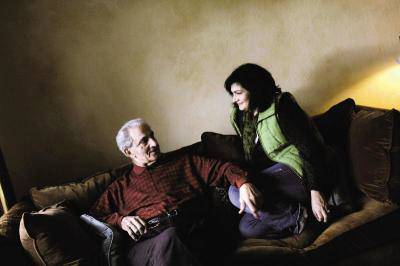|
|
Care
for County's Elders Reaches Tipping Point
By
Jocelyn Wiener, Center for California Health Care Journalism
February
21, 2009

Peter Tsouprake, 80, left, sits with his daughter Irene Tsouprake, 49, in her home in Santa Cruz. Peter moved in with his daughter and her family so that she could care for him.
Elderly and disabled patients are flabbergasted. Caring relatives are alarmed. Some doctors are conflicted; others are angry. And virtually everyone touched by Santa Cruz County's inability to care for its Medicare patients is frustrated.
All seem to agree on at least one thing: The health care system in this county -- and, by extension, this country -- is breaking down.
Local primary care doctors are closing their doors to new Medicare patients, saying they're fed up with the low reimbursement rates paid by the federal insurance program for the elderly and disabled. Rules written half a century ago require that local doctors get reimbursed at the same low rate as their counterparts in Merced, despite having a cost of living that rivals San Jose's.
The fallout from the county's Medicare crisis touches people on all sides of the issue. It impacts disabled and elderly patients, like 81-year-old Peter Tsouprake, an Air Force veteran who moved to Santa Cruz to be near his daughters. For months, Irene Tsouprake couldn't find a physician willing to care for her dad.
"This is complete insanity," she remembers thinking, as doctor after doctor told her they weren't accepting Medicare.
The crisis impacts medical providers at local community clinics, like Jennifer Hastings, who end up treating those patients when no one else will see them. It impacts primary care doctors like Chris O'Grady, who struggle to reconcile their commitment to care for the sick with their desire to earn a decent living.
Indirectly, it impacts the rest of us as well. The shortage of primary care providers may be hitting those who depend on Medicare particularly hard in this county -- but the privately insured are feeling the pinch, too.
"We're reaching a tipping point," said O'Grady, a Watsonville-based primary care doctor who specializes in geriatrics and also serves as president of the Santa Cruz Medical Society. He understands why many doctors are closing their doors to new Medicare patients. For several months last year, he did the same thing.
Some doctors who reside in Santa Cruz, like Dr. Nicholas Abidi, actually choose to practice full or part-time in Santa Clara County, where reimbursement rates are up to 25 percent higher than they are here.
With time and effort, many patients eventually find doctors. But for others, the system can seem an impossible maze. Still others end up turning to emergency rooms, where doctors and ER case managers like Lynn Szanto are already under tremendous pressure from growing numbers of unemployed and uninsured patients.
Eventually, Irene Tsouprake did find a doctor for her father. But she worries about other seniors, especially those who don't have anyone to advocate for them. The baby boomers are about to start turning 65, she notes. What then?
"It's going to get bigger and bigger, that problem," she said. "We can't just keep ignoring it."
More Information on US Health Issues
|
|



